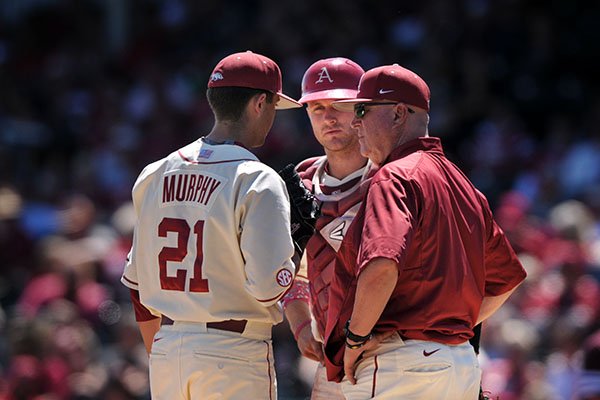FAYETTEVILLE — Walking Dave and Talking Dave.
Those were the nicknames coined by longtime Arkansas Democrat-Gazette baseball reporter Rick Fires to describe the Razorbacks' coaches with the same first name.
More from WholeHogSports
http://www.wholehog…">Two UA signees named state player of the year
Arkansas fans knew the drill. When head coach Dave Van Horn came to the mound, he brought the hook and his pitchers were sent walking. But when pitching coach Dave Jorn made a visit, it was only to deliver a talking.
"He came to the mound one time and said, 'What the hell are you doing?'" former pitcher Ryne Stanek said. "I had no answer."
Jorn knew how to interact with teenagers and 20-somethings through his many stories.
"There was one time we had practice and we were all in the dugout, and he was on the steps and it started raining," said former Arkansas catcher James McCann, now a starter for the Detroit Tigers. "His talk lasted so long that by the time he finished it had stopped raining and the steps had dried off."
But more than his lectures, Jorn's results spoke the loudest. Together, the Arkansas Daves established one of college baseball's most consistent programs in their 14 years together. The Razorbacks had never missed the postseason during their tenures until this year.
Arkansas' recent struggles on the mound do little to deter from Jorn's overall success. In his most recent stint - he was also the Razorbacks' pitching coach for six seasons in the 1980s - the program had 30 pitchers drafted, including seven in the first two rounds of the MLB Draft. Zach Jackson may be an eighth pick next month.
Three of Jorn's former pitchers - Dallas Keuchel, Drew Smyly and Mike Bolsinger - are now in the major leagues. Jorn has numerous more pitchers scattered throughout the minor leagues.
"It points to the type of players who are brought there, but furthermore it shows the type of development that occurred once they were there," McCann said. "One thing no one can take away from Coach Jorn is the development of the pitchers while they were on campus."
Jorn did more than develop just pitchers. He worked with catchers like McCann, Brady Toops and Brian Walker, and Andrew Benintendi's big break came when Jorn described midway through his freshman season how pitchers were getting him out.
"He treated each player - it didn't matter if it was a pitcher, hitter, catcher - like he was one of his own," McCann said. "He helped young men grow into men. He had a big-time effect on me and my career. His knowledge is off the charts."
Arkansas' pitching staffs were typically solid, but it was the three-year run from 2011-13 for which Jorn will be remembered best. The Razorbacks had a sub-3.00 ERA in all three seasons, capped by a team ERA of 1.89 in 2013 - the lowest for any college baseball team since 1976.
After that, Jorn was considered one of college baseball's elite pitching coaches. In a broad sense, the secret to his success was pretty simple.
"He was big on being simple and not trying to do too much," said Stanek, who was drafted by the Rays in the first round of the 2013 draft and now pitches for Double-A Montgomery. "We didn't really make many physical adjustments over the years. What we talked more about was the mental side and not trying to do too much, not trying to be perfect every time, not trying to throw the ball through a brick wall."
But Jorn's most defining characteristic was how he trained his pitchers. They ran and ran, creating a mental toughness that could be translated to the mound during a jam.
"He wanted us to be strong people in tough situations," Stanek said. "He put us through a lot of tough running to see what we could take.
"After I got drafted, I realized it was one of those things where he was really hard on me because he wanted the best for me and not to squander any opportunity, or waste any of my ability. It's the old school menatlity. You've got to be hard on people or else they're going to be soft. You don't want anyone soft playing baseball for you.”
